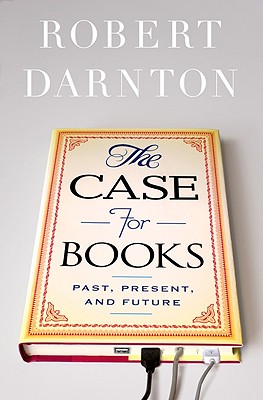Some of the ideas presented in this book have already been described wonderfully by Ariel Letts. Like Ariel, I also ironically listened to this book, which advocates the use and need for physical books. I really liked the points that Ariel made about the book.
Below is a short video of Robert Darnton speaking on the idea of information overload.
It is really amazing to have the ability to search online in order to put a name to a voice and a face. At the beginning of this clip, Darnton makes a point that he also makes in his book:
"The death of the book really is exaggerated. More titles are produced each year than in the preceding year worldwide. With the exception of last year which was a disaster for everyone. The graph goes up and up and up, and it's nearly one million new titles in print. The old-fashioned printed codex is doing very well, thank you. But it means that we suffer from information overload. Everyone in this room does, I'm sure, but it is not new."
I agree with Darnton that books have a purpose still in society, and that they will remain irreplaceable for many circumstances for many years to come. As Darnton points out, other new media forms, such as radio and e-mail, have not led to the eradication of their predecessors.
Here is a link to a podcast interviewing Robert Darnton about The Case for Books: Past, Present, and Future. I think that he would have been a much better narrator for his book than the narrator that I listened to, whose slight lisp sometimes made listening difficult. Darnton's story examples are so interesting. If you have a few minutes, I suggest listening to the video or/and part of the podcast.
Do you agree with his view of books in the future?

In our class we're learning all about the importance of the consumption of literature; how we consume it, it seems, is only important inasmuch as it changes our experience with the work. We are still taking it in, and it is still becoming a part of us, which is what truly matters. With that said, I feel that if we begin to see a decrease in physical book literacy, so to speak, there is need to be concerned because that is a unique way of experiencing a text that can't be reproduced by other methods. Based on your post, I feel that's what Darnton is saying, and I believe that he's right.
ReplyDeleteI was grateful to see and hear Darnton, which is now affecting my interpretation of his works which I've been reading. Thanks for including the video and the podcast link. I also listened to some of the podcast, and his comments about the inevitable change to the book form are valuable. It strikes me as somewhat amusing that he is both a critic and a proponent of Google, and that he is such a conservative but is not averse to being on YouTube or on a CBC podcast. I think he's having his cake and eating it, too.
ReplyDeletePhysical book literacy is an interesting concept, Amy. Lots of nostalgia involved with that, and I'm not sure how long the plea for physical format will hold up against the inevitability of ebooks.